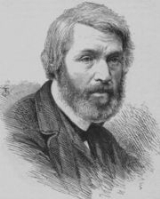
writer, essayist, historian
and teacher during the Victorian era
.
He called economics
"the dismal science", wrote articles for the Edinburgh Encyclopedia
, and became a controversial social commentator.
Coming from a strict Calvinist
family, Carlyle was expected to become a preacher by his parents, but while at the University of Edinburgh
, he lost his Christian faith. Calvinist values, however, remained with him throughout his life.
Not all his men may sever this, It yields to friends', not monarchs', calls;My whinstone house my castle is— I have my own four walls.![]()
Speech is human, silence is divine, yet also brutish and dead: therefore we must learn both arts.![]()
It is now almost my sole rule of life to clear myself of cants and formulas, as of poisonous Nessus shirts.![]()
The Public is an old woman. Let her maunder and mumble.![]()
A witty statesman said, you might prove anything by figures.![]()
Democracy is, by the nature of it, a self-canceling business; and it gives in the long run a net result of zero.![]()
He that works and does some Poem, not he that merely says one, is worthy of the name of Poet.![]()
A Parliament speaking through reporters to Buncombe and the twenty-seven millions, mostly fools.![]()

